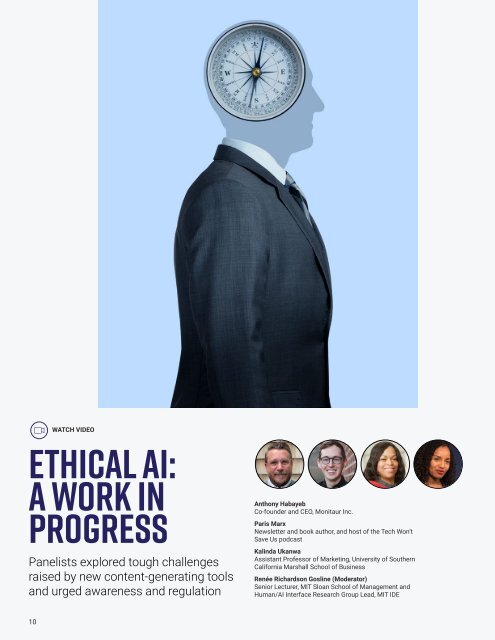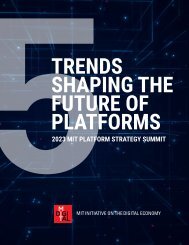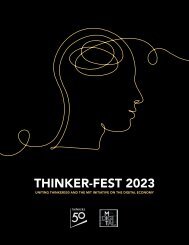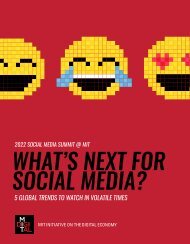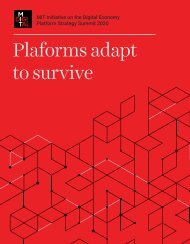The 2023 Social Media Summit@MIT Event Report
Create successful ePaper yourself
Turn your PDF publications into a flip-book with our unique Google optimized e-Paper software.
WATCH VIDEO<br />
ETHICAL AI:<br />
A WORK IN<br />
PROGRESS<br />
Panelists explored tough challenges<br />
raised by new content-generating tools<br />
and urged awareness and regulation<br />
Anthony Habayeb<br />
Co-founder and CEO, Monitaur Inc.<br />
Paris Marx<br />
Newsletter and book author, and host of the Tech Won’t<br />
Save Us podcast<br />
Kalinda Ukanwa<br />
Assistant Professor of Marketing, University of Southern<br />
California Marshall School of Business<br />
Renée Richardson Gosline (Moderator)<br />
Senior Lecturer, MIT Sloan School of Management and<br />
Human/AI Interface Research Group Lead, MIT IDE<br />
Like most tools, generative AI can be put to use for many<br />
purposes. It can create impressive new text and images from<br />
existing content. But it also lacks oversight, and is guilty of<br />
bias and hasty corporate rollouts.<br />
<strong>The</strong> opportunities as well as the risks of new AI tools were<br />
discussed by the Responsible, Human-First AI panel at the<br />
<strong>Social</strong> <strong>Media</strong> <strong>Summit@MIT</strong>. <strong>The</strong> discussion, moderated<br />
by MIT’s Renée Richardson Gosline, offered perspectives<br />
from a business leader charged with implementing ethical<br />
AI, an academic who is developing systems and future<br />
programmers, and an outsider critiquing it all.<br />
“Generative AI models have gained widespread adoption,”<br />
Gosline said, citing reports that ChatGPT gained 100 million<br />
users in just two months after its November 2022 launch. “But<br />
what does this mean?”<br />
AI in the Spotlight<br />
AI isn’t actually new, noted Kalinda Ukanwa. “Whether we’re<br />
selecting a movie from Netflix or using a GPS app to find our<br />
way around a city, we’ve been interacting with AI all along,”<br />
she said. “Yet people did not perceive that as AI. It was always<br />
this thing that was running in the background.”<br />
That’s changed with the advent of generative AI tools.<br />
ChatGPT is now part of the “kitchen-table conversation,”<br />
said Anthony Habayeb.<br />
Concerns over the potential harms of generative AI have<br />
extended to governments. Sam Altman, CEO of OpenAI,<br />
the company that created ChatGPT, recently told the U.S.<br />
Congress that AI needs more regulation. U.S. President<br />
Biden, speaking to recent graduates of the country’s Air Force<br />
Academy, worried aloud about AI’s ability to “overtake human<br />
thinking.” And the European Union is considering a new<br />
legal framework, known as the AI Act, that would regulate AI<br />
development and use.<br />
While Ukanwa doesn’t expect “to get to a place where [AI] is<br />
not going to harm anybody,” she asked, “How do we minimize<br />
that harm in an intelligent way?” Ukanwa’s recent research<br />
paper, Algorithmic Fairness and Service Failures:<br />
Why firms Should Want Algorithmic Accountability, makes<br />
the case for third-party monitors of AI development, who<br />
don’t have skin in the game.<br />
Paris Marx sees a darker motive behind both the spread of<br />
generative AI tools and the explosion of interest they’ve<br />
generated. “<strong>The</strong>se technologies are inherently political, less<br />
in the sense of party politics and more in the term’s broader<br />
meaning,” he said. “When these technologies are developed<br />
and deployed, there are certain goals and desires.”<br />
Marx views the hype over ChatGPT “getting the venture<br />
capitalists excited again,” spurring investment, and getting<br />
Microsoft to challenge Google so that responsible AI isn’t a<br />
priority. But while platforms are publicly saying they’re going to<br />
implement ChatCPT responsibly, “they’re laying off and firing<br />
all of the AI ethicists,” Marx said.<br />
AI bias is baked in by its human programmers, panelists noted,<br />
whether consciously or not. In addition, generative AI tools rely<br />
on already existing content, and they have no way of filtering<br />
that content for bias or inaccuracies.<br />
Responsible Solutions<br />
Yet Habayeb sees solutions. “AI is built by people and it can<br />
be managed,” he said. For instance, insurance company data<br />
may be biased against a certain cohort causing higher rates.<br />
“<strong>The</strong>re might be other data that we can bring into an AI system<br />
to make the pricing outcome more equitable,” Habayeb added.<br />
Gosline said that while we can’t put the AI genie back in the<br />
bottle, we can use AI more critically and deliberately. Ukanwa<br />
sees the need for greater awareness, too. She recently<br />
participated in a town hall meeting on AI, sponsored by a<br />
Los Angeles radio station, that addressed generative AI<br />
and its potential impact on society. “Afterwards,” Ukanwa<br />
recounted, “people said, ‘I didn’t know these were the<br />
implications of AI.’”<br />
Marx clearly favors government oversight. He’s skeptical of<br />
corporate motives for self-regulation that put profits over<br />
social good. “<strong>The</strong>re are many ways these technologies can be<br />
rolled out in a negative way,” he said. “Unless there’s pressure<br />
from the government,” consumer rights are not considered.<br />
Could the profit versus ethics argument be false? Ukanwa<br />
thinks so. “<strong>The</strong>re’s this narrative that if I do something ethical,<br />
I’m going to lose profits, and I can’t have both,” she said. “But a<br />
lot of research is building a case that you can have both.”<br />
<strong>The</strong>re are good business reasons to develop fair algorithms,<br />
Ukanwa said, adding, “This is what shareholders need<br />
to understand.” Habayeb agreed: “Proactive governance<br />
messaging is good for business.”<br />
“A lot of research is building the<br />
case that you don’t have to sacrifice<br />
profits for business ethics.”<br />
Kalinda Ukanwa<br />
Assistant Professor of Marketing, University of Southern California Marshall School of Business<br />
10<br />
11


